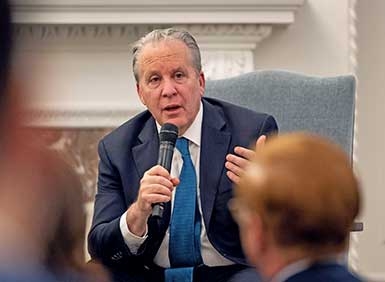In Katzmann Lecture, senior Biden advisor Gene Sperling asserts importance of economic dignity
What place does human dignity have in economic policymaking? It should be central, said Gene Sperling, senior advisor to President Biden and coordinator of the American Rescue Plan, when he delivered the third annual Robert A. Katzmann Lecture on April 24.
Sperling, who served as national economic adviser under Bill Clinton and Barack Obama, was close friends with Katzmann, a judge on the US Court of Appeals for the Second Circuit, for four decades before Katzmann’s death in 2021. In his lecture, Sperling discussed the theme of his 2020 book Economic Dignity, in which he argued that the success of economic policies should be judged by the dignity and security they offered citizens and not solely by metrics such as the gross domestic product.
Sperling enumerated three criteria: “One, do you have, through your economic effort, the capacity to care for the people you love and to be there for life’s most precious moments?... Two, do you have a true first and second chance to pursue a sense of purpose and potential? And three, are you able to work and contribute in the economy with respect, as opposed to domination and humiliation?”
For Sperling, this triad of principles served as a sort of gut check during his time in the Clinton administration, he explained. They constituted what he called the deathbed test: “What would somebody say on their deathbed was the most important thing about their economic lives to their [personal] life?”
He admitted that writing a book about a largely unmeasurable end goal of economic policy made him worry about not being taken seriously. “I pride myself and am part of a world of National Economic Council policymaking which is based on rigor, data, and evidence,” he said. But in the end, Sperling added, he proceeded with the project “so that the next person in my situation doesn’t feel uncomfortable doing that.”
Without clear principles, he said, it was easier for him and other advisors to lose sight of the need to uplift people through policy. “Once you’re in that White House,…it’s going to be focused on what can get 60 votes, what can get 218 votes, what’s the ‘it’ policy of the moment, what’s going to help you bridge different policy coalitions on your side or get an extra vote,” said Sperling. “Of course. But shouldn’t you at least come to that table with a sense of why you might favor a particular policy over another?”
Problems without existing metrics tend not to be recognized, he said, citing the lack of attention that the issues facing care workers or those being sexually harassed in the workplace received in the 1990s. During the COVID-19 pandemic, Sperling added, even those in the upper middle class experienced “really painful harms” that were impossible to quantify: being absent from the birth of a grandchild, a graduation, the passing of a loved one. “These are the pains of not being able to care for family and be there at life’s most precious moments that tens of millions of people experience very day, even if we don’t measure it properly,” he said.
“An end goal like economic dignity is for me also, in a sense, a rule of justice,” Sperling added.
“In Wealth of Nations,” he pointed out, “Adam Smith very specifically says that people who provide for others must be able to provide for their family. That never got as much mileage as the invisible hand, but that’s right in there…. It doesn’t mean you’d necessarily have a $25 minimum wage or you’d write checks to everybody…but you would be forced to, around that table of rigor, figure out how we meet that basic floor…. If people work full time, they should not have to raise their children in despair and poverty and insecurity.”
Posted May 30, 2024


